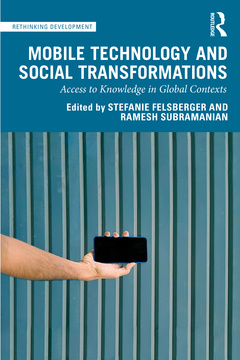Description
Mobile Technology and Social Transformations
Access to Knowledge in Global Contexts
Rethinking Development Series
Coordinators: Felsberger Stefanie, Subramanian Ramesh
Language: English
Subjects for Mobile Technology and Social Transformations:
Keywords
Telecommunication; Mobile Technologies; Mobile; Mobile Social Media; Technology; Mobile Phone; Social Transformations; Violate; Knowledge; Mobile Telephony; Economic; Umbrella Movement; Held; Mobile technology; Gateway; Mobile internet; Socio-economic Development; Communication; Mobile Phone Users; IMEI; UN; Ride Sharing Services; Public Utility Model; Face To Face; Mobile Revolution; Local Network Operators; Travis Kalanick; Occupy Wall Street; Follow; Speech Spaces; Local Network Providers; South Korean Society; Syrian Revolution
Publication date: 05-2021
· 15.6x23.4 cm · Paperback
Publication date: 05-2021
· 15.6x23.4 cm · Hardback
Description
/li>Contents
/li>Readership
/li>Biography
/li>
This book investigates the ways in which the mobile telephone has transformed societies around the world, bringing both opportunities and challenges. At a time when knowledge and truth are increasingly contested, the book asks how mobile technology has changed the ways in which people create, disseminate, and access knowledge.
Worldwide, mobile internet access has surpassed desktop access, and it is estimated that by 2022 there will be AN excess of 6 billion mobile phone users in the world. This widespread proliferation raises all sorts of questions around who creates knowledge, how is that knowledge shared and proliferated, and what are the structural political, economic, and legal conditions in which knowledge is accessed. The practices and power dynamics around mobile technologies are location specific. They look different depending on whether one chooses to highlight the legal, social, political, or economic context. Bringing together scholars, journalists, activists and practitioners from around the world, this book embraces this complexity, providing a multifaceted picture that acknowledges the tensions and contradictions surrounding accessing knowledge through mobile technologies.
With case studies from Hong Kong, South Korea, India, Syria, Egypt, Botswana, Brazil, and the US, this book provides an important account of the changing nature of our access to knowledge, and is key reading for students, researchers, activists and policy makers with an interest in technology and access to knowledge, communication, social transformation, and global development.
INTRODUCTION 1. Introduction: Mobile Technologies and Access to Knowledge, Ramesh Subramanian & Stefanie Felsberger PART 1: ACCESS 2. Access: Mobile Technologies and A2K, Ramesh Subramanian INDIA 3. Enhancing A2K through M-Learning: Reflections from a Study on Foreign Language Teaching in an Indian Metropolis, John B. Lourdusamy & Rishika Czarzasta INDIA 4.. Pain of the Last Mile: Human to Human ICT Interface for the Poor and the Marginalized, Saji Matthew, Arun Kumar & Ramesh Subramanian BOTSWANA, 5. The Diffusion and Civic Application of Mobile Telephony: The Case of Botswana, William O. Lesitaokana BRAZIL 6. The Blocking of Non-Approved Cell phones in Brazil: An A2K Perspective, Celina M.A. Bottino, Carlos Affonso Souza & Beatriz L.M. Nunes PART 2: CONTROL 7. Control: Mobile Technologies and A2K, Stefanie Felsberger SYRIA 8. The Tragic Dream of Autonomous Internet Access: The Case of Bassel Safadi and the Syrian Revolution, Harry Halpin UNITED STATES, 9. Government-Provided Internet Access, Infrastructures of Free Expression, and the Role of the State, Enrique Armijo BRAZIL 10. The Treasure Trove’s Tale: A Study on the Evolution and Popularization of Phones and Law Enforcement Access to Communications in Brazil, Dennys Antonialli & Jacqueline de Souza Abreu PART 3: SOCIAL CHANGE & ECONOMIC OPPORTUNITY 11. Social Change, Economic Opportunity & Mobile Technologies, Stefanie Felsberger HONG KONG 12. Mobile Social Media, Activism, and Social Change: Reflecting on the Umbrella Movement in Hong Kong, Colin Agur SOUTH KOREA 13. A2K & Role of Mobile Technologies in South Korea’s Impeachment Scandal, Shubhangi Gokhale EGYPT 14. An A2K Perspective on Ride Sharing Legislation: The Case of Uber in Egypt, Nagla Rizk CONCLUSION 15. Contradictions and Tensions in Mobile Technologies and A2K, Stefanie Felsberger
Stefanie Felsberger is a Bartlett Fellow at the Access to Knowledge for Development Center, American University of Cairo, Egypt and PhD Researcher at the Center for Gender Studies, Cambridge University.
Ramesh Subramanian is the Gabriel Ferrucci Professor of Information Systems at the School of Business, Quinnipiac University, Connecticut, and A2K Fellow at the Information Society Project, Yale Law School.




